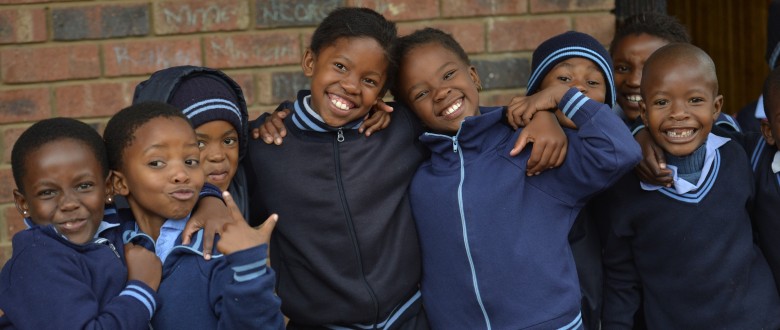
The European Week of Action for Girls (10 – 14 October) is all about GIRL POWER. In the next few days, we will reflect on just a few examples of how VVOB secures the right of girls and young women to quality education, both in our partner countries and in Flanders.
No better way to kick off this European week than to delve deeper into VVOB’s newly launched, EU co-funded project on improving inclusive teaching in South Africa. Together with the EU and local partners, VVOB will support teachers to identify and address barriers to learning experienced by young learners in primary schools – be it a disability or linked to their race, class, origin or, of course, gender.
One of the local partners we will work with is Inclusive Education South Africa (IESA), a non-profit organisation that promotes and supports inclusive practices in schools across the country. “Concerns for gender are often cast aside by schools already working on linguistic, racial or cultural barriers to learning”, asserts Robyn Beere, director at IESA (small picture), “South Africa remains a patriarchal society where girls and young women are often burdened with more household chores and have little choice in decisions that affect them.”
Sexual violence
In South Africa, a strong legal and policy framework and guidelines prescribe how schools should address gender-based violence. However, schools are not required to adopt these (EFA Global Monitoring Report 2015). In practice, in-school social and emotional support for young learners who fall victim to sexual violence is inadequate. “Victims often display behaviour that may be perceived as unruly, lazy or absentminded in school. Unless the learner openly explains what has happened to them, this change of behaviour is left unexplored and misunderstood by teachers”, explains Robyn. IESA has been trying to change this rigid attitude of schools towards its pupils since 1995.
Sexual violence greatly impacts every child’s learning. And so does pregnancy; 60.000 primary and secondary learners become pregnant in South Africa every year. They do not have a good support system to fall back on either. Schools will ask pregnant girls to leave, and girls who do not have access to child care cannot come back after giving birth. And that is a scary thought. “I gave a workshop to a group of 18-year old students once”, Robyn recalls, “and asked them what they thought could ruin their bright futures. They responded with ‘teen pregnancy’ – like they did not have a say in what happened to their body or life.”
Robyn’s consideration is a rights-based one, which is often complex within South African cultures. When a young girl falls pregnant, families might prefer to consult with a tribal authority. They will decide how much the perpetrator has to pay for the baby. A police investigation, court case or punishment are not as important. “It is not easy to encourage people to adopt a rights-based approach to the issue, when it is contrary to their culture”, explains Robyn. “This affects women most. They are terribly vulnerable and most at risk of being excluded from all social aspects of life, not just from education.”
Inclusivity implies gender equality
In a country where the right to quality education of girls is systematically threatened, and where school leaders, officials and lawmakers are predominantly male, gender-based violence is inadequately addressed. Because of South Africa’s history and the current influx of people from neighbouring countries, schools that do have some sort of policy on diversity, prioritise barriers to learning relating to race, language and culture at the expense of attention for gender-related barriers to learning.
But in general, schools do not look at diversity at all. Through the EU co-funded project, VVOB, IESA and local partners seek to equip student and existing teachers with the necessary skills to identify and address all barriers to learning. Gender-related barriers and solutions to them will therefore be raised systematically as part of the wider diversity debate. “We do not want to make diversity a single-issue debate, because in reality the barriers children experience in South Africa are many and varied”, warns Robyn. “For example, young girls with intellectual disabilities in special schools are even more vulnerable to sexual abuse, and even less supported. This concerns both gender and disability, and in most cases also socioeconomic aspects.”
Intersectionality recognises that certain groups of people have intersecting social identities that they are discriminated against for, such as gender and disability in the above example. “That is why we will support teachers and schools to look at children holistically in the project. We want to encourage schools to create safe environments for each and every pupil. Gender is an integral part of inclusive education in South Africa, but mostly overlooked.”
Want to meet Robyn? She will be part of a South African delegation coming to Brussels (BE) for a panel discussion on inclusive education on 26 October: “SEN Act, one year later: what can we learn from South Africa?”. The event is free, but registration is required (and going fast!).




